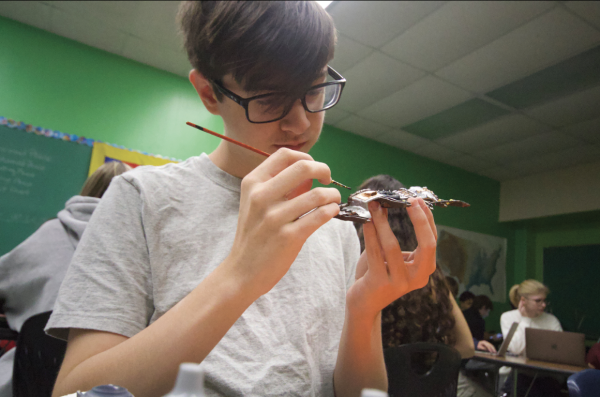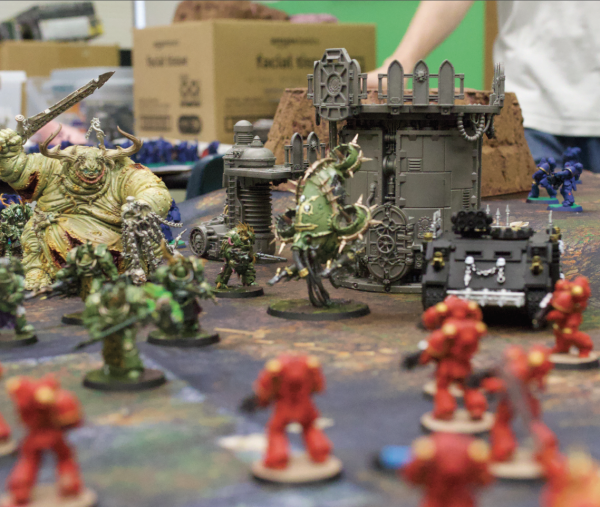Squinting to see the tiniest details, Miniature Gaming Club members add the final touches to their figurines. One table over, students lay out boards with complex structures and terrain. With their freshly painted warriors and intricate sets, students prepare to battle.
“I have people that love to come in and just assemble models and paint, and have some that do both painting and playing,” club sponsor Charles Stampley said. “So, that involves, not only do you have to put the models together, you also have to paint them and then plan out what you’re going to do.”
The Miniature Gaming Club members play games like Warhammer 40K, Age of Sigmar, historical games, and gothic and high fantasy skirmishes with miniatures that are painted by hand by Bowie students. The club meets every Thursday after school. In the fall, games are played in Stampley’s room B108, and in the spring members also play in Michael Reeves’ room F214.
“There are definitely people who go from game to game,” senior Will Kulczar said. “But I feel like most of the club members stick to one thing.”
Warhammer 40k is a tabletop war game set far in the future with human fighters and aliens. The games involve humans and a diverse array of alien factions and races that battle in a dystopian world.

“I’ve always been a fan of miniatures, Warhammer and magic, more of these nerd type games,” junior Kaden Beard said. “I was just kind of looking around to see if the school had any clubs like that, and so then I came here.”
The miniatures are made with plastic bases which can be bought online or at local gaming stores and then painted to perfection. The club was started last year and focused mainly on historical war games. For the 2024-2025 school year, club members are exploring the multitude of games that can be played with these figures.
“Last year we focused more on historical miniatures, like World War II, historical stuff,” Beard said. “And now this year [we’re focusing on] more of the Sci-Fi aspect.”
According to BoardGameGeek, a popular online gaming forum, Warhammer 40k is currently the most popular miniature war game, but materials required can cost as much as $150, and some miniatures are subject to price gouging. To play, students must first procure the complex bases and materials.
“The miniatures in general are pretty expensive overall,” Beard said. “So, it’s not just a hobby you can really get into.”
The miniature gaming club has the benefit of support from the gaming community in Austin. According to Stampley, Fellowship Hobby and Games on FM 1626 in Buda has provided collectibles, pots of paint, brushes, primer, crating supplies and donations to the club. The club received a particularly large donation from an anonymous donor of more than $5,000 last May. That donation, along with ones from local businesses, have allowed the club to participate in more games and experiment with new painting techniques.
“Nobody needs to spend anything,” Stampley said. “I actually tell people, if this [miniature] is 50 bucks you don’t need to pay, I’ve probably got two of them.”
Students are able to explore every aspect of miniature gaming, from playing to painting and assembling. According to Beard, painting the miniatures requires intense focus and specific techniques.
“You have to be gentle because the slightest brush can have too much paint, or too little,” Beard said. “You just have to get used to painting something small and delicate.”
Painting the figures can seem daunting to new members, but Stampley and senior members are passionate about teaching the skill. The specific techniques range from beginner friendly to incredibly technical.
“They’re always very nervous at first because the models are so small, but then once you show them that they’re actually a lot easier to paint, they get interested and that’s what makes me happy,” Stampley said. “They start coming back, and then later we can add things like ink and wash and different shading over different colors, so that’s my favorite.”

While some members prefer to paint, many participate in the games themselves, and most do both. While the most popular game is Warhammer 40k, the club facilitates games of Dungeons and Dragons, Magic: The Gathering, and historical games like Bolt Action.
“We’re setting up for a game called Bolt Action, which is World War II,” Stampley said. “It’s Americans versus Germans, so there’s a history side to it as well.”
Historical games such as Bolt Action also provide an academic benefit. Bolt Action puts the player in command of famous battles of World War II. In order to engage in the game, Stampley provides educational resources for students.
“We do historical lectures on the topics we cover in the games,” Stampley said. “So, it’s really a little bit for everybody.”
Students may play games set in the past, but the miniature gaming club has their eyes set on the future. According to Stampley, the club anticipates more donations to allow them to continue playing and learning.
“Everyone is completely willing to teach people how to play the games, and just give people resources,” Kulczar said. “We have a bunch of people who are willing to just let people learn and play.”
This story was originally published on The Dispatch on November 22, 2024.



































